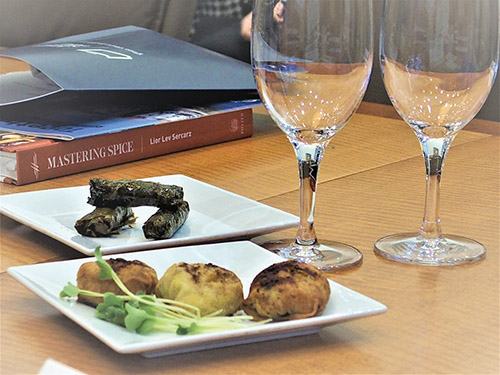





Two of today’s most well-known chefs are about to revolutionize the world of food production and culinary education—especially kosher culinary education—in Israel. The Jewish National Fund-USA is creating a new “food-tech ecosystem” in Kiryat Shmona, in the northern Galilee, that will include the Beit Asher Food and Technology Innovation Center on the Greenbaum Campus, and on a parallel track, the Galilee Culinary Institute, on the Marvin Sukonik Campus. The Culinary Institute is being directed by Lior Lev Sercarz, owner of La Boite, a New York purveyor of spices and biscuits, and will be guided by a Culinary Advisory Council that has just named its first member: Michael Solomonov, winner of the 2017 James Beard Award for outstanding American chef, founder of Zahav in Philadelphia, and host of the documentary “In Search of Israel Cuisine,” now on Netflix.
Planned to open next year, the two centers will work together to revitalize the northern Galilee, where Israel already gets 40% of its food, by bringing in students from all over the world to research, develop and learn all aspects of food production and gain skills to succeed in the food industry, from food preparation through business management. In a statement, JNF-USA President Sol Lizerbaum gave examples of some of the innovative projects the Technology Innovation Center will be working on: “Imagine a future where machine learning and A.I. drives 100% predictable agriculture, where drought-tolerant plants are developed using CRISPR (gene editing) technology, and where we conduct research and development on new and alternative sources for protein.”
Speaking at a press briefing in New York on October 29, JNF CEO Russel Robinson said the Galilee Culinary Institute will be the only culinary school to “teach the front and back of the house,” where students will learn about cooking the cuisines of the many cultures that make up Israel in a way that isn’t available anywhere else in the world, and the management skills that will help them succeed.
Solomonov said, “GCI by JNF will be a new type of culinary school, where budding chefs will work with the unique mix of cultures and cuisines that can only be found in the north of Israel. We will teach students how to cook and also how to run a profitable, sustainable business.”
The kitchens and the restaurant the students will run will be kosher. Sercarz said there were many reasons behind the decision to make the facilities kosher and they are challenging themselves to “make amazing kosher food.” As an aside, he mentioned that he had had a fantastic meal at a restaurant in Israel, perhaps the best in his life, that he didn’t even know was kosher at the time. He joked about speaking to one potential student who was excited about the center’s “lactose-free baking program” that doesn’t exist anywhere else. Who knew pareve could be an attraction? Students who want to learn techniques or use ingredients that can’t be taught in a kosher kitchen can take classes off-site.
Solomonov said he looks forward to providing training for aspiring kosher chefs. “If you’re kosher and want to be a chef, there aren’t a lot of options. For kids who grow up observant, there’s nowhere to go.” He mentioned that two restaurants in his group, Goldie’s and Dizengoff, just got hechsherim. While his flagship restaurant Zahav does not have kosher supervision, he said they do not use treif ingredients or mix milk and meat.
The main program will be a two-year course, but classes will be available for visitors and tourists. A hotel is also planned. Some of the JNF fundraising now taking place will go toward scholarships for the degree programs. The first class is expected next year and so far will include a mix of Italians, Americans and Israelis. The courses will be taught in English but all documents will be translated into Hebrew and possibly other languages as needed.
Both Sercarz and Solomonov talked about how difficult it was for them to become chefs; both left Israel for culinary school in France. Sercarz said his mom cried when he told her he wanted to be a chef. She thought he would be a failure, but then said ‘be the best failure’ and study in France. Since then he has been thinking: “Could we change this notion? Can we teach culinary arts in Israel so parents like mine won’t be devastated?”
Sercarz said that whenever he talked about his vision of teaching culinary arts in Israel, people would say, ‘This project is great; it’s never going to work, but when it does open, we want to come and visit.” Two and a half years ago, a friend from Israel called and told him she thought she found the organization, JNF, that could help him. After a brief meeting, the deal was sealed.
The nay-sayers will finally be able to visit.
By Bracha Schwartz










